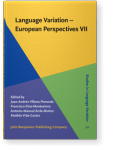Chapter 6
Virtual sociolinguistics
From real-time surveying to virtual-time archival
sources for tracing change longitudinally
The limitations of apparent-time approaches and
the difficulties of conducting studies in real-time for
observing language change have traditionally been one of
the main methodological concerns in sociolinguistics since
the 1960s. However, archived radio recordings and
historical corpora of written correspondence have recently
been demonstrated to be excellent sources for both
cross-sectional and longitudinal approaches. The aim of
this paper is to show the results from two studies where
radio and historical archival sources afford comparative
evidence for tracing language change developments. The
conclusions suggest that these resources offer a
privileged perspective for the historical reconstruction
of linguistic change in present-day or remote languages,
functioning as virtual approaches where the problem of
real-time in the longitudinal
research procedure is conveniently neutralised.
Article outline
- 1.Introduction
- 2.Trend study with radio archive sources
- 3.Panel study with historical corpora of written
correspondence
- 4.Conclusion
-
References
